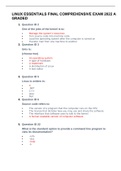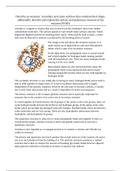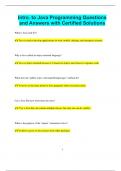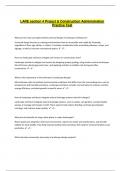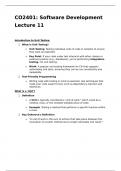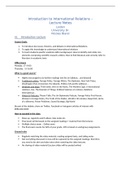Unit 12: Main Introduction
Adults and children in all communities require additional help to deal with the
daily obstacles that are part of their everyday existence. Some of these
obstacles are the result of society's attitude to differently abled individuals and
children, rather than a disability. I will be looking at the word diagnostic which
means “The process of identifying a disease, condition, or injury from its signs
and symptoms.” (National Cancer Institute April 12 2018). and the word
procedure which means “a written set of step-by-step instructions for how a
specific activity is to be conducted,” (the access group.com january 2023) for
the delivery of medication, as an illustration. Contrary to a policy, it is less
concerned with the general perspective and method. and together these words
make diagnostic procedures which means a procedure (excluding Diagnostic
Imaging) that is performed on a patient in order to diagnose a condition, disease
or illness. Another term I would be using throughout my report would be
diagnostic assessment which means “gathering key information to describe and
understand the patient's clinical condition and to organise an effective care
plan.” (national library of medicine February 2001).
In the report for this unit I will be using two case studies. Each respectfully
called Rebecca Brown who is a child and Ben Grace who is an adult throughout my
report I will be linking them to my work. Rebbecca is a 8 year old girl who is a
wheelchair user who does require one to one assistance. and attends a school for
children with additional needs. Ben is a fifty two year old who has diabetes and
down syndrome he requires support with all aspects of daily living and lives in a
group setting
Introduction to P1, M1 and D1
For the P1 criteria I will be looking to explain different diagnostic procedures
which can determine additional needs for a child and an adult with different
additional needs like my two case studies Rebecca and Ben. A learning disability
means “a reduced intellectual ability and difficulty with everyday
activities”(menap.org february 2023) for instance, chores around the house,
socialising, or money management - all of which have a long-term impact on a
person.
For the M1 criteria I will be looking at the different requirements that a person
with special needs may need to meet and this will be assessed for both an adult
, and a child like my two case studies Rebecca and Ben. there can be many
different requirements that someone with special need may require these could
range from
a carer to extra time in an exam.
For the D1 criteria I will be looking at and evaluating the significance of my two
case studies individually and I will also be looking at their families and society. of
the diagnosis of additional needs. It is important to think of the families when
dealing with someone of special needs. This is so the family is aware of what they
can do to help the person with special needs. it is also important for society to
learn about different special needs so it can eliminate bullying in society
Case study 1. Rebecca Brown (Child Study)
Rebecca Brown is 8 years old and is a wheelchair user, following a road
traffic accident when she was five years old. Rebecca requires one to one
personal care due to her physical disabilities, as she sustained a fractured
spine in the accident, meaning that she has no movement below her
cervical spine (tetraplegia)
Rebecca attends a school for children with additional needs, where she has
a designated teaching assistant and a carer who provides her with personal
care during the school day.
Rebecca lives with her parents Sue and David and her older sibling Michael
who is 12 years of age. The family live in an upstairs apartment provided by a
housing association, which is small and not ‘wheelchair friendly’.
Sue has a part time job at a local day nursery but has to stay at home during
the school holidays, in order to care for Rebecca and Michael, reducing the
family income. David works full-time at a local factory, working long hours for
a low wage.
The neighbourhood where the Brown family live are not tolerant of
Rebecca’s ‘difference’, and the family have received unpleasant comments
as they pass neighbours in the street, causing them to avoid going out
whenever possible.
,Case study 1. Ben Grace (Adult Study)
Ben Grace is fifty-two and has Down’s syndrome and type 2 diabetes. Ben
has a learning age of 8 and requires support with all aspects of daily living.
Ben lives in a group setting with five other adults who have learning difficulties
and who also require additional support. Ben previously lived with his mother,
but following her death last year, Ben moved to the residential setting.
Ben has always enjoyed going shopping, but since he has moved into the
residence, he prefers to stay in his room which is a concern for the staff,
following an incident with some local youths who shouted at Ben when he
went shopping with the residents and carers. Recently Ben was refused entry
to a local funfair by the manager who stated that Ben’s appearance could
prevent other people wanting to attend.
Ben is refusing to keep to the special diet required to control his type 2
diabetes and staff have found bags of sweets under his pillow when making
his bed. His blood glucose levels are unstable, resulting in Ben feeling unwell.
Ben has become withdrawn.
, Learning Aim A: Examine reasons why individuals may experience additional
needs
Diagnosing or determining additional needs
Define:
Mild learning disabilities
“A person who is said to have a mild learning disability is usually able to hold a
conversation, and communicate most of their needs and wishes” (national
association of disability january 2023). To comprehend abstract or difficult
concepts, they might want some assistance. People frequently take care of
themselves alone and handle various daily duties. Usually, they possess some
fundamental writing and reading abilities. Mild learning disabilities in people are
frequently undetected. The majority of individuals still require the proper
assistance with chores like budgeting and filling out documents.
Moderate learning disabilities
People with a moderate learning disability “are likely to have some language skills
that mean they can communicate about their day to day needs and wishes”
(national association of disability january 2023). Those with mild learning
impairments can require some assistance with personal care, but many can do
Adults and children in all communities require additional help to deal with the
daily obstacles that are part of their everyday existence. Some of these
obstacles are the result of society's attitude to differently abled individuals and
children, rather than a disability. I will be looking at the word diagnostic which
means “The process of identifying a disease, condition, or injury from its signs
and symptoms.” (National Cancer Institute April 12 2018). and the word
procedure which means “a written set of step-by-step instructions for how a
specific activity is to be conducted,” (the access group.com january 2023) for
the delivery of medication, as an illustration. Contrary to a policy, it is less
concerned with the general perspective and method. and together these words
make diagnostic procedures which means a procedure (excluding Diagnostic
Imaging) that is performed on a patient in order to diagnose a condition, disease
or illness. Another term I would be using throughout my report would be
diagnostic assessment which means “gathering key information to describe and
understand the patient's clinical condition and to organise an effective care
plan.” (national library of medicine February 2001).
In the report for this unit I will be using two case studies. Each respectfully
called Rebecca Brown who is a child and Ben Grace who is an adult throughout my
report I will be linking them to my work. Rebbecca is a 8 year old girl who is a
wheelchair user who does require one to one assistance. and attends a school for
children with additional needs. Ben is a fifty two year old who has diabetes and
down syndrome he requires support with all aspects of daily living and lives in a
group setting
Introduction to P1, M1 and D1
For the P1 criteria I will be looking to explain different diagnostic procedures
which can determine additional needs for a child and an adult with different
additional needs like my two case studies Rebecca and Ben. A learning disability
means “a reduced intellectual ability and difficulty with everyday
activities”(menap.org february 2023) for instance, chores around the house,
socialising, or money management - all of which have a long-term impact on a
person.
For the M1 criteria I will be looking at the different requirements that a person
with special needs may need to meet and this will be assessed for both an adult
, and a child like my two case studies Rebecca and Ben. there can be many
different requirements that someone with special need may require these could
range from
a carer to extra time in an exam.
For the D1 criteria I will be looking at and evaluating the significance of my two
case studies individually and I will also be looking at their families and society. of
the diagnosis of additional needs. It is important to think of the families when
dealing with someone of special needs. This is so the family is aware of what they
can do to help the person with special needs. it is also important for society to
learn about different special needs so it can eliminate bullying in society
Case study 1. Rebecca Brown (Child Study)
Rebecca Brown is 8 years old and is a wheelchair user, following a road
traffic accident when she was five years old. Rebecca requires one to one
personal care due to her physical disabilities, as she sustained a fractured
spine in the accident, meaning that she has no movement below her
cervical spine (tetraplegia)
Rebecca attends a school for children with additional needs, where she has
a designated teaching assistant and a carer who provides her with personal
care during the school day.
Rebecca lives with her parents Sue and David and her older sibling Michael
who is 12 years of age. The family live in an upstairs apartment provided by a
housing association, which is small and not ‘wheelchair friendly’.
Sue has a part time job at a local day nursery but has to stay at home during
the school holidays, in order to care for Rebecca and Michael, reducing the
family income. David works full-time at a local factory, working long hours for
a low wage.
The neighbourhood where the Brown family live are not tolerant of
Rebecca’s ‘difference’, and the family have received unpleasant comments
as they pass neighbours in the street, causing them to avoid going out
whenever possible.
,Case study 1. Ben Grace (Adult Study)
Ben Grace is fifty-two and has Down’s syndrome and type 2 diabetes. Ben
has a learning age of 8 and requires support with all aspects of daily living.
Ben lives in a group setting with five other adults who have learning difficulties
and who also require additional support. Ben previously lived with his mother,
but following her death last year, Ben moved to the residential setting.
Ben has always enjoyed going shopping, but since he has moved into the
residence, he prefers to stay in his room which is a concern for the staff,
following an incident with some local youths who shouted at Ben when he
went shopping with the residents and carers. Recently Ben was refused entry
to a local funfair by the manager who stated that Ben’s appearance could
prevent other people wanting to attend.
Ben is refusing to keep to the special diet required to control his type 2
diabetes and staff have found bags of sweets under his pillow when making
his bed. His blood glucose levels are unstable, resulting in Ben feeling unwell.
Ben has become withdrawn.
, Learning Aim A: Examine reasons why individuals may experience additional
needs
Diagnosing or determining additional needs
Define:
Mild learning disabilities
“A person who is said to have a mild learning disability is usually able to hold a
conversation, and communicate most of their needs and wishes” (national
association of disability january 2023). To comprehend abstract or difficult
concepts, they might want some assistance. People frequently take care of
themselves alone and handle various daily duties. Usually, they possess some
fundamental writing and reading abilities. Mild learning disabilities in people are
frequently undetected. The majority of individuals still require the proper
assistance with chores like budgeting and filling out documents.
Moderate learning disabilities
People with a moderate learning disability “are likely to have some language skills
that mean they can communicate about their day to day needs and wishes”
(national association of disability january 2023). Those with mild learning
impairments can require some assistance with personal care, but many can do

